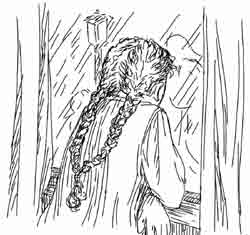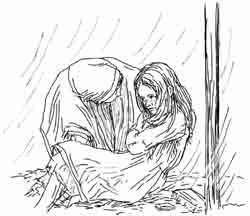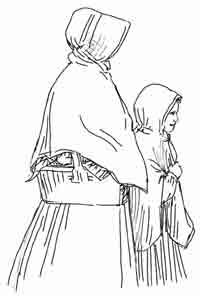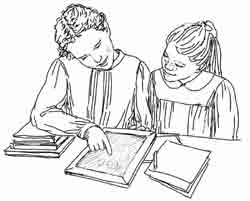Little Red Cloak

Here is Alice standing by the parlor window after tea, looking out upon the winter night.
There is a high wind, and it has been snowing through the day. It is a cold, cheerless night, and the foot-passengers are hurrying along the dreary streets. The flickering gaslight reveals the form of a poor match-girl, who, weak, hungry and cold, has fallen under the lamp, with her basket of matches by her side.
Out runs little Alice with her red cloak on. The child is moaning with pain and suffering, but, with the aid of the cook, the shivering child is brought into the warm kitchen and laid on a settee near the fire.

“Isn’t it a pity, Nancy?” said Alice. “Just see how old her clothes are; she has only one thin petticoat and this ragged dress. I know that we have something to spare,” and away ran “Little Red Cloak” to seek out mamma.
“Oh, Mamma! just come down to the kitchen,” said the child. “There is such a poor little girl there, so cold and hungry. Haven’t we something to give her?”
“I will go and look, Alice. I think we have an old cloak and a warm dress and skirt. But run back again, my dear, and tell Nancy to give her a good supper; I will soon follow you.”
The kind-hearted cook had not waited for orders, for when Alice returned the child was sitting by the kitchen-table and eating heartily what Nancy had prepared.
Didn’t the brown eyes sparkle at the sight? Alice seated herself where she could enjoy the pleasant picture, and in a little while Mrs. Murray entered, with a bundle of good warm clothing hanging on her arm.
“Poor child!” said the good lady, as she turned up the old ragged dress and saw the threadbare petticoat and bare legs of the little girl.
In a few minutes a pair of good stockings, some comfortable shoes and warm winter garments replaced the threadbare rags, and the match-girl’s eyes filled with glad tears as she said, “Thank you! dear good lady. We are so poor. Mother has been sick all winter and father didn’t do right. He has had no work for a whole year.”
“Where do you live, little girl?” asked Mrs. Murray.
“In Taylor’s court, ma’am. Last year we had some nice things in our house—a good table and some chairs, a bedstead and warm bed, and some bed clothes; but they are all gone now.”
“Where have they gone to?” inquired the listener.
“Father sold them. Then mother got sick and couldn’t work any more, and I sell matches to get something to eat.”
Mrs. Murray took the directions and promised to call upon them and see what could be done.
Little Peggy was a thankful child when she bade goodnight, for she carried home a basket of good food, with some money to buy a little coal, and, better than all, the feeling that they had found a friend.

The next day was a bright cold day, and Mrs. Murray, with “Little Red Cloak,” started for Taylor’s court.
Peggy’s story was all true.
It was a sight of misery. A poor, sick woman in the corner, on a bundle of old rags, with nothing but a worn-out cloak to cover her, a drunken man by the stove fast asleep, and little Peggy getting something ready for her mother to eat.
Mrs. Murray took the case in hand, had the wretched man sent to the alms-house, provided a physician from the dispensary, and then sent a bedstead, with warm bed-clothes and whatever was necessary for the comfort of the poor woman. Kindness and proper food soon restored the sufferer, and as soon as she was well enough Mrs. Murray got for the mother a good place in a respectable family, whilst she took little Peggy into her own family, to learn to be a waiter. Thus Peggy was cared for, and also removed from the bad influences of her home.
Alice always felt as if Peggy belonged very much to her, and the little warm-hearted Irish girl in return looked upon the child as one sent by heaven to save her mother and herself from starving.
It was a pleasant sight to watch the love between the two. If any delicacy fell to Peggy’s lot, away she would run to Miss Alice with the nice ripe peach, the red-cheeked apple, or juicy pear.
“And sure it isn’t for the likes o’ me,” the little girl would say; “I niver was used to no sich things, and it’s jest the thing for your pretty little mouth.”
“But I have had quite enough, Peggy, and mamma likes you to have a share always.”
“I know, Miss, that you’re often hungry when you come in from school. Jest take it, honey, to please little Peggy. I would a heap rather see you have it than eat it myself,” and the child would run off laughing, leaving the gift of love behind.
Alice would not eat the fruit, but many a time would she return the same to Nancy, telling her to bring it out as her own gift to little Peggy.
Every Saturday the mother came to look after her child, and Alice Murray was very happy when she saw the cheerful, neatly-clad woman, with such a healthy look, and little Peggy smiling by her side. Alice had not forgotten the cold night when she brought in the little girl from the winter storm, or the miserable home where they had found the two.

Peggy was very ignorant, for their poverty had kept her away from school, and so Alice thought that she must teach her little girl. Accordingly, every evening after tea, the two are seen around the kitchen-table, Alice with her schoolbooks, and Peggy, with her bright Irish face, listening to her kind, young teacher. After the lessons were over, nothing delighted Peggy so much as the pretty stories that Miss Alice read from her Sunday-school books.
Sweet spirit of love! A little drop of the same that brought Jesus from the skies to bless and save a world of sinners. The dewdrops fell all unconsciously from the lips of little Alice, and found their way into the heart of Peggy, the match-girl.
Goodbye, Peggy; we leave you to the care of the “Little Red Cloak.” God lead you both from the parlor and the kitchen safely home to the better land!
No wonder that Alice Murray is a blithe singing bird, with a heart so full of love and a life so full of kind actions. She loves to think of Jesus and to study the sweet chapters that tell about his patience, his tenderness and love. She thinks of Him the first thing in the morning and the last at night. Alice has other pleasant thoughts, but this is the one great idea that swallows up all the rest. Some are like the little stars, but Jesus is the bright sun of Alice Murray’s young heart.